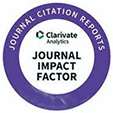Activated Carbon from Spent Brewery Barley Husks for Cadmium Ion Adsorption from Aqueous Solution
Ilesanmi Osasona(1*), Kayode Aiyedatiwa(2), Jonathan Johnson(3), Oluwabamise Lekan Faboya(4)
(1) Afe Babalola University, Ado - Ekiti
(2) Afe Babalola Univesity, Ado - Ekiti
(3) Afe Babalola University, Ado - Ekiti
(4) Afe Babalola University, Ado - Ekiti
(*) Corresponding Author
Abstract
This study investigated the feasibility of using acid activated carbon prepared from brewery spent barley husks for the adsorption of cadmium from aqueous solution. The effects of operation parameters such as pH, contact time, adsorbent dosage, concentration and temperature were verified. The amount of cadmium adsorbed increased with increase in solution pH, initial solution concentration and with the amount of adsorbent dosed. A time of 5 minutes was required for attainment of equilibrium. The equilibrium data obtained were analysed using both Langmuir and Freundlich isotherm models and the data were better described by Langmuir model with correlation coefficient of 0.9183. The thermodynamic parameters revealed that the removal of cadmium by the activated carbon was exothermic and spontaneous. Thus, activated carbon obtained from brewery spent barley husk can be employed as an economically viable low-cost adsorbent for removing cadmium from aqueous solution.
Keywords
Full Text:
Full Text PDFReferences
[1] Volesky, B., and Holan, Z.R., 1995, Biosorption of heavy metals, Biotechnol. Prog., 11 (3), 235–250.
[2] Pagana, A.E., Sklari, S.D., Kikkinides, E.S., and Zaspalis, V.T., 2008, Microporous ceramic membrane technology for the removal of arsenic and chromium ions from contaminated water, Microporous Mesoporous Mater., 110 (1), 150–156.
[3] Donia, A.M., Atia, A.A., and Mabrouk, D.H., 2011, Fast kinetic and efficient removal of As(V) from aqueous solution using anion exchange resins, J. Hazard. Mater., 191 (1-3), 1–7.
[4] Sud, D., Mahajan, G., and Kaur, M.P., 2008, Agricultural waste material as potential adsorbent for sequestering heavy metal ions from aqueous solutions - A review, Bioresour. Technol., 99 (14), 6017–6027.
[5] Khezami, L., and Capart, R., 2005, Removal of chromium(VI) from aqueous solution by activated carbons: Kinetic and equilibrium studies, J. Hazard. Mater., 123 (1-3), 223–231.
[6] Osasona, I., Adebayo, A.O., and Ajayi, O.O., 2013, Adsorptive removal of chromium(VI) from aqueous solution using cow hooves, J. Sci. Res. Rep., 2 (1), 288–303.
[7] Nasuha, N., Hameed, B.H., and Mohd Din, A.T., 2010, Rejected tea as a potential low-cost adsorbent for the removal of methylene blue, J. Hazard. Mater., 175 (1-3),126-132.
[8] Musatto, S.I., 2014, Brewer's spent grain: A valuable feedstock for industrial applications, J. Sci. Food Agric., 94 (7), 1264–1275.
[9] Ekpete, O.A., Horsfall Jnr, M., and Tarawou, T., 2011, Sorption kinetic study on the removal of phenol using fluted pumpkin and commercial activated carbon, Int. J. Biol. Chem. Sci., 5 (3),1143–1152.
[10] Olajire, A.A., Abidemi, J.J., Lateef, A., and Benson, N.U., 2017, Adsorptive desulphurization of model oil by Ag nanoparticles-modified activated carbon prepared from brewer’s spent grains, J. Environ. Chem. Eng., 5 (1), 147–159.
[11] Vijayaraghavan, K., and Yun, Y.S., 2008, Bacterial biosorbents and biosorption, Biotechnol. Adv., 26, 266–291.
[12] Kumar, P.S., Ramalingam, S., Abhinaya, R.V., Kirupha, S.D., Murugesan, A., and Sivanesan, S., 2012, Adsorption of metal ions onto the chemically modified agricultural waste, Clean–Soil, Air, Water, 40 (2), 188–197.
[13] Machida, M., Yamazaki, R., Aikawa, M., and Tatsumoto, H., 2005, Role of minerals in carbonaceous adsorbents for removal of Pb(II) ions from aqueous solution, Sep. Purif. Technol., 46 (1-2), 88–94.
[14] Li, K., and Wang, X., 2009, Adsorptive removal of Pb(II) by activated carbon prepared from Spartina alterniflora: Equilibrium, kinetics and thermodynamics, Bioresour. Technol., 100 (11), 2810–2815.
[15] Al-Asheh, S., Banat, F., and Al-Rousan, D., 2003, Beneficial reuse of chicken feathers in removal of heavy metals from wastewater, J. Cleaner Prod., 11 (3), 321–323.
[16] Ahmad, R., 2009, Studies on adsorption of crystal violet dye from aqueous solution onto coniferous pinus bark powder (CPBP), J. Hazard. Mater., 171 (1-3), 767–773.
[17] Osasona, I., Faboya, O.L., and Oso, A.O., 2013, Kinetic, equilibrium and thermodynamic studies of the adsorption of methylene blue from synthetic wastewater using cow hooves, Br. J. Appl. Sci. Technol., 3 (4), 1006–1021.
[18] Gaya, U.I., Otene, E., and Abdullah, A.H., 2015, Adsorption of aqueous Cd(II) and Pb(II) on activated carbon nanopores prepared by chemical activation of doum palm shell, SpringerPlus, 4, 458–475.
[19] Rao, M.M., Ramesh, A., Rao, G.P.C., and Seshaiah, X., 2006, Removal of copper and cadmium from the aqueous solutions by activated carbon derived from Ceiba pentandra hulls, J. Hazard. Mater., 129 (1-3), 123–129.
[20] Dowlatshahi, S., Torbati, A.R.H., and Loloei, M., 2014, Adsorption of copper, lead and cadmium from aqueous solutions by activated carbon prepared from saffron leaves, Environ. Health Eng. Manage. J., 1(1), 37–44.
[21] Kumar, P.R., Swathanthra, P.A., Rao, V.V.B., and Rao, S.R.M., 2014, Adsorption of cadmium and zinc ions from aqueous solution using low cost adsorbents, J. Appl. Sci., 14 (3), 1372–1378.
[22] Bohli, T., Ouederni, A., Fiol, N., and Villaescusa, I., 2012, Uptake of Cd2+ and Ni2+ metal ions from aqueous solutions by activated carbons derived from waste olive stones, Int. J. Chem. Eng. Appl., 3 (4), 232–236.
[23] Kumar, U, 2006, Agricultural products and by-products as a low cost adsorbent for heavy metal removal from water and wastewater: A review, Sci. Res. Essay, 1 (2), 33–37.
Article Metrics
Copyright (c) 2017 Indonesian Journal of Chemistry

This work is licensed under a Creative Commons Attribution-NonCommercial-NoDerivatives 4.0 International License.
Indonesian Journal of Chemistry (ISSN 1411-9420 /e-ISSN 2460-1578) - Chemistry Department, Universitas Gadjah Mada, Indonesia.












